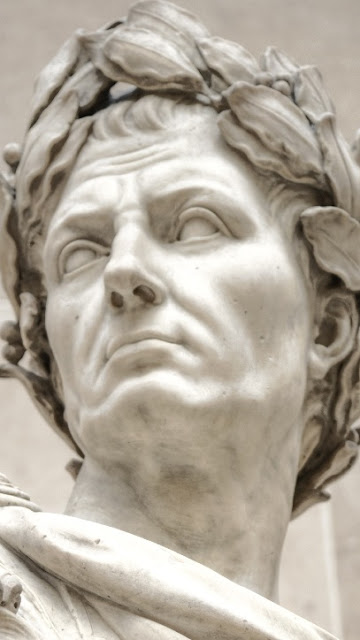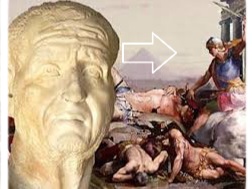Introduction of The Roman Persecution of Christians
The Roman persecution of Christians stands as a significant chapter in the early history of Christianity. Spanning several centuries, it reflects the complex relationship between the Roman Empire and the emerging Christian faith. This essay aims to provide an overview of the Roman persecution of Christians, exploring its causes, methods, and implications for both the Roman state and the nascent Christian movement.
 |
| Roman persecution of Christianity |
- Context and Early Hostility
In the early years of Christianity, the Roman Empire was primarily polytheistic, with the state religion centered on the worship of Roman gods and emperor cults. The exclusivity of Christian monotheism and its refusal to participate in pagan rituals often led to tensions and suspicion. Christians were seen as a threat to the social order and were subjected to sporadic acts of violence and persecution, particularly during the reigns of Nero and Domitian.
- Legal Status and Persecution
The persecution of Christians intensified in the 3rd century when the Roman state began to view Christianity as a destabilizing force. Emperors such as Decius and Diocletian issued edicts that required Christians to participate in state-sanctioned religious ceremonies or face severe consequences. Non-compliance often resulted in imprisonment, torture, confiscation of property, and, in some cases, execution.
- Motivations for Persecution
The Roman persecution of Christians can be attributed to various factors. Firstly, Christians' refusal to worship the Roman gods was viewed as a threat to the religious and social cohesion of the empire. Secondly, Christians' refusal to participate in emperor cults was seen as an act of disloyalty to the state. Additionally, Christians were sometimes scapegoated for societal ills and natural disasters, further fueling animosity towards them.
- Methods and Impact
The persecution of Christians took various forms, ranging from localized acts of violence to empire-wide persecutions. Christians were subjected to public executions, imprisonment, forced labor, and the destruction of their religious meeting places. However, despite the intense persecution, Christianity continued to grow, and the resilience of the early Christian community became a powerful testimony to the faith.
The persecution also had unintended consequences for the Roman Empire. It created sympathy for Christians among the population, as many were impressed by the courage and steadfastness of the persecuted believers. The brutal methods employed by the state also raised questions about the morality and legitimacy of the Roman government.
- Constantine and the End of Persecution
The Edict of Milan in 313, issued by Emperor Constantine, marked a turning point in the Roman persecution of Christians. It granted toleration to Christianity, ending the state-sponsored persecution. Subsequently, Christianity gradually gained official recognition and eventually became the state religion under Emperor Theodosius in 380.
Persecution and Martyrdom
The Roman persecution of Christians led to numerous cases of martyrdom. Christians who refused to renounce their faith and conform to Roman religious practices were often subjected to cruel and public executions. Some notable examples include the martyrdoms of Saints Peter and Paul in Rome during the reign of Nero, and the martyrdom of Polycarp, the bishop of Smyrna, during the reign of Marcus Aurelius. These acts of martyrdom became powerful symbols of Christian faith and resilience, inspiring future generations of believers.
1. Persecution as a Catalyst for Christian Identity
The persecution played a significant role in shaping the early Christian identity. It created a sense of unity and solidarity among believers as they faced a common adversary. The shared experience of persecution fostered a strong sense of community and commitment to the faith. Persecution also led to the development of theological reflections on suffering, martyrdom, and the role of faith in the face of adversity.
2. Persecution and Christian Apologetics
The Roman persecution of Christians prompted the development of Christian apologetic literature. Apologists such as Justin Martyr and Tertullian defended the Christian faith, refuted false accusations, and argued for the legitimacy and moral superiority of Christianity. These writings aimed to counteract the negative perceptions of Christianity propagated by the Roman authorities and to present the Christian faith as a rational and virtuous alternative.
3. Impact on the Spread of Christianity
Paradoxically, the Roman persecution of Christians contributed to the spread of Christianity. The persecution forced Christians to disperse and seek refuge in various regions of the empire, carrying their faith with them. As they interacted with different cultures and communities, they shared their beliefs, leading to the expansion of Christianity beyond its original Jewish roots. The resilience and courage displayed by persecuted Christians also attracted new converts, as the strength of their faith became a powerful testimony.
4. Shift from Persecution to State Sponsorship
The Edict of Milan, issued by Constantine in 313, marked a significant shift in the Roman Empire's approach to Christianity. This edict granted religious toleration to Christians, effectively ending the state-sponsored persecution. Constantine's subsequent conversion to Christianity and the eventual establishment of Christianity as the state religion transformed the relationship between the Roman Empire and Christianity. The once-persecuted faith became an influential force within the empire, shaping its culture, institutions, and governance.
 |
| Roman persecution of Christianity |
Overall, the Roman persecution of Christians was a complex and multifaceted phenomenon. While it aimed to suppress the growth of Christianity, it ultimately contributed to its endurance and expansion. The persecution forged a strong Christian identity, inspired martyrdom, spurred theological reflection, and played a role in the development of Christian apologetics. The shift from persecution to state sponsorship marked a turning point in the history of Christianity, leading to its eventual establishment as the dominant religion within the Roman Empire.
Certainly! Here are some additional aspects to delve deeper into the Roman persecution of Christians:
5. Persecution as a Legal Response
The Roman persecution of Christians was not solely driven by religious or social animosity but also had a legal dimension. The Roman state viewed Christianity as an illegal and subversive movement that refused to conform to the established religious and social order. As such, persecution was seen as a necessary response to maintain social stability and the authority of the state. Roman officials and emperors saw the enforcement of religious conformity as essential for the well-being of the empire.
6. Local Initiatives and Imperial Policy
While some persecutions were regionally or locally instigated, there were also instances when imperial policy specifically targeted Christians. Emperors such as Decius and Diocletian issued empire-wide edicts that required individuals to demonstrate their loyalty to the Roman state by participating in traditional religious practices. Christians who refused to comply were subject to punishment. These imperial edicts reflected a broader strategy to maintain the religious and social unity of the empire.
7. Conflicts with Jewish Communities
The early Christian movement emerged within a Jewish context, and tensions arose between Christians and Jewish communities. In some instances, these conflicts resulted in Christians being expelled from synagogues or facing hostility from Jewish leaders. However, it is important to note that the Roman persecution of Christians was distinct from these conflicts and was primarily driven by Roman authorities' concerns about the impact of Christianity on the empire as a whole.
8. Persecution and Social Status
The Roman persecution of Christians affected individuals from various social strata. While Christians from all walks of life were persecuted, it is worth noting that members of the lower classes were particularly vulnerable. They often lacked the social standing or connections to protect themselves from persecution. However, there were also instances where Christians from wealthy or influential backgrounds faced persecution due to their refusal to renounce their faith.
9. Legacy and Historical Memory
The memory of the Roman persecution of Christians had a lasting impact on Christian history and identity. The stories of martyrs and their steadfastness in the face of persecution became an integral part of Christian tradition. Martyrdom was viewed as the ultimate act of devotion and sacrifice, and the veneration of martyrs became an important aspect of Christian spirituality. The stories of early Christian martyrs continue to inspire and shape the faith of believers to this day.
10. Comparative Perspectives
It is worth considering the Roman persecution of Christians in the context of other religious persecutions throughout history. By examining the similarities and differences between different instances of religious persecution, a broader understanding of the dynamics and motivations behind such acts can be gained. This comparative approach can shed light on the complexities of religious intolerance and the ways in which societies have dealt with religious minorities.
 |
| Roman persecution of Christianity |
The Roman persecution of Christians remains a significant period in the history of both the Roman Empire and Christianity. Exploring its legal, social, and historical dimensions allows for a deeper understanding of the challenges faced by early Christians and the profound impact of these experiences on the development of the Christian faith.
During the Roman persecution of Christians, believers faced various forms of punishment and mistreatment.
Here are some specific examples of the punishments inflicted upon Christians:
1. Execution by Crucifixion
Crucifixion was a common method of execution in the Roman Empire, and some Christians were subjected to this brutal form of punishment. It involved nailing or binding the condemned individual to a wooden cross, where they would suffer a slow and agonizing death.
 |
| Roman persecution of Christianity |
2. Execution by Beheading
Beheading was another method of execution used against Christians. The condemned person would have their head severed from their body, often in a public setting, as a means of instilling fear and discouraging others from following the Christian faith.
3. Burning at the Stake
Christians were sometimes burned alive as a means of punishment. They would be tied to a stake or pyre and set on fire, leading to a painful and horrific death.
4. Wild Animal Attacks
In some instances, Christians were thrown into arenas or amphitheaters to be attacked by wild animals, such as lions or bears. This form of punishment was often used as a form of public entertainment, with the intent of both punishing and humiliating the Christians.
 |
| Roman persecution of Christianity |
5. Imprisonment and Forced Labor
Many Christians were imprisoned as a result of their faith. They would be confined in dungeons or prisons, often in harsh conditions. Some were also subjected to forced labor, where they were made to work in mines, quarries, or other labor-intensive tasks.
6. Torture and Interrogation
Christians were frequently subjected to torture and interrogation in an attempt to force them to renounce their faith or disclose information about other Christians. Common methods of torture included flogging, whipping, and various forms of physical and psychological abuse.
7. Confiscation of Property and Exile
Christians often had their property confiscated as a form of punishment. This included the seizure of their homes, possessions, and assets. Additionally, some Christians were exiled from their communities or forcibly relocated to remote regions as a means of suppressing their influence.
It is important to note that the severity of the punishments varied over time and across different regions of the Roman Empire. The level of persecution also fluctuated under different emperors and in response to specific political or social circumstances. Nonetheless, these examples highlight the range of punishments inflicted upon Christians during the Roman persecution, reflecting the intense hostility they faced for their religious beliefs.
The Roman persecution of Christians in Egypt was a significant aspect of early Christian history. Egypt was home to a thriving Christian community and experienced various waves of persecution throughout the Roman Empire's rule. Here are some key points about the persecution of Christians in Egypt:
- Early Christian Presence in Egypt
Christianity gained a strong foothold in Egypt during the early centuries of the Roman Empire. The city of Alexandria, in particular, emerged as a prominent center of Christian thought and scholarship. Notable figures such as Clement of Alexandria and Origen played crucial roles in shaping early Christian theology and apologetics.
1. Persecution under Roman Emperors
Christians in Egypt faced persecution under several Roman emperors. Emperor Decius, in the 3rd century, issued an edict that required all individuals to offer sacrifices to the Roman gods as a sign of loyalty. Christians who refused to comply were subject to persecution, imprisonment, and even death. Emperor Diocletian's Great Persecution in the late 3rd and early 4th centuries also targeted Christians, leading to widespread suffering and martyrdom.
 |
| Roman persecution of Christianity |
2. The Alexandrian School and Intellectual Conflict
The Alexandrian School of Christian thought, with its emphasis on philosophical and theological exploration, often clashed with pagan intellectuals in Alexandria. These conflicts sometimes escalated into violence and persecution, as pagan philosophers and scholars viewed Christianity as a threat to their religious and intellectual authority.
3. Martyrdom and Perseverance
The persecution in Egypt resulted in numerous cases of martyrdom, with Christians steadfastly refusing to renounce their faith. The martyrdom of Saint Mark, the founder of the Coptic Orthodox Church, is a significant example. Christians in Egypt developed a strong tradition of martyrdom, which became a source of inspiration and resilience for future generations of believers.
4. Egyptian Monasticism
The Roman persecution of Christians in Egypt played a role in the development of Egyptian monasticism. Some Christians sought refuge in the desert and established communities of monks and hermits. These monastic communities, such as those founded by Saint Anthony the Great, provided a haven for Christians seeking to live out their faith in solitude and devotion, away from the persecution in urban areas.
 |
| Bishop Anthony, the first of the monks |
5. Edict of Milan and Religious Freedom
The Edict of Milan, issued in 313 by Emperor Constantine and co-emperor Licinius, granted religious freedom to Christians and ended the state-sponsored persecution. This edict marked a significant turning point, as Christianity transitioned from a persecuted minority to a tolerated and eventually favored religion within the Roman Empire.
The Roman persecution of Christians in Egypt left a lasting impact on the region's Christian history. The courage and perseverance of Egyptian Christians during times of persecution contributed to the growth and resilience of the faith. Today, Egypt continues to be home to a significant Christian minority, particularly within the Coptic Orthodox Church, which traces its roots back to the early Christian communities in Egypt.
Conclusion:
The Roman persecution of Christians represents a tumultuous period in the history of both the Roman Empire and Christianity. Driven by religious, social, and political factors, the persecution aimed to suppress the growth of Christianity and maintain the established religious and social order of the empire. However, the resilience of the early Christian community and the moral questions raised by the persecution ultimately contributed to the spread and eventual triumph of Christianity in the Roman Empire. The persecution serves as a testament to the enduring faith of early Christians and the profound impact of their beliefs on the course of history
